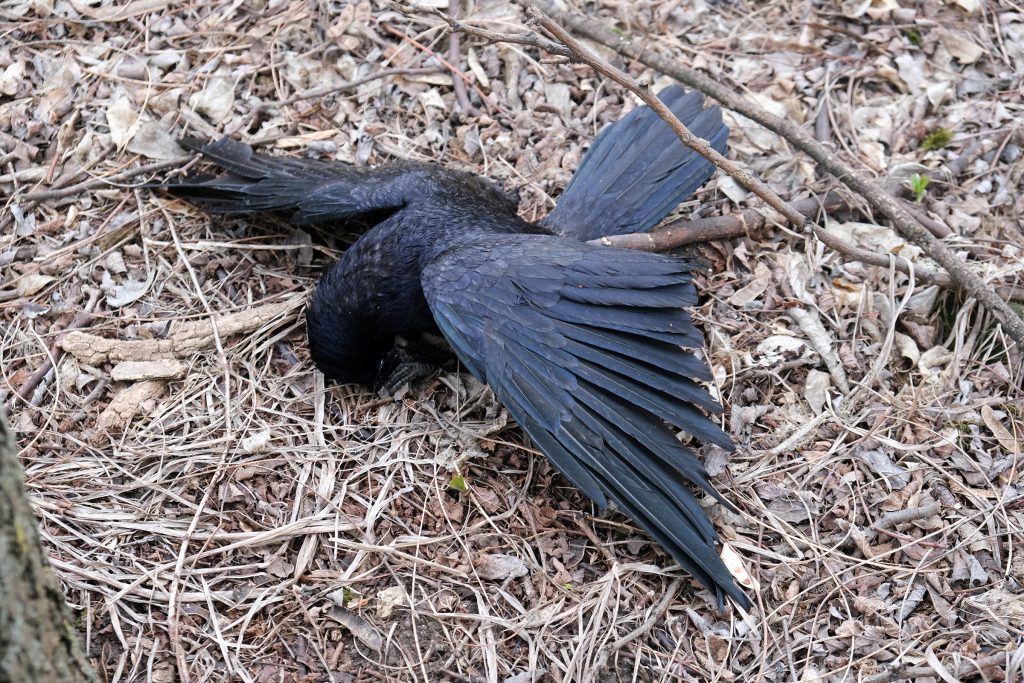The fields surrounding the village of Nakovo have fallen into an unsettling silence, broken only by the sound of Rooks and Jackdaws plummeting dead from of trees and bushes. These birds, member of the crow family, once thrived in these fields, searching for insects, larvae, and grain. Tragically, it was here that they encountered deadly baits, unwittingly consuming what would become their final meal.
A local beekeeper, Ranko Samardžija, discovered several dead birds as he made his way towards his bee hives along the dirt road leading north of the village. As he continued along the path that follows the drainage canal, he saw more dead birds; some lying on the ground, some stuck in the trees and bushes. Haunted by memories of a previous mass poisoning incident that decimated over 1,600 bee colonies back in 2015, Samardžija feared for his bees’ safety and decided to make a video to share on Facebook. Several hours later, pressured by the public, he removed the video from the social media. But not before the images were seen by members of BPSSS.
Adding to the distressing situation, the discovery of the dead birds raised further concerns as in the near vicinity of the incident, a pair of Eastern Imperial Eagles have established their nesting grounds. The significant number of deceased birds can easily attract large birds of prey that are critically endangered in Serbia. Recognizing the gravity of the situation, Milan Ružić, the executive director of BPSSS, promptly reached out to Ranko Samardžija.
“On Saturday evening, on the 2nd of March, I sent a notification to the Institute for Nature Conservation of Vojvodina Province, as well as to the prosecution office in Kikinda and the Environmental Crime Police Unit of the Ministry of Interior affairs, informing them of the suspicions concerning a mass poisoning incident near Nakovo,” said Ružić. “Fearing for the fate of the Imperial Eagles, we quickly mobilized a field crew to come on Sunday morning. As the Republic of Serbia doesn’t have an official jurisdiction schematics or protocol for poisoning incidents, I also informed a local police station, which sent a patrol consisting of two officers.”

A calamity of this magnitude soon attracted the attention of the general public and in a couple of hours, an unexpectedly high number of police officers, veterinary inspectors, and communal service officials arrived on the site of the tragedy. The cadavers were dispersed in a radius of approximately two kilometers. One by one, the bodies were counted and placed into black bags. The grim process unfolded as the forensics crew meticulously recorded every detail, bearing witness to the somber aftermath of the incident. Upon completion, a certain number of birds were selected for further analysis, while the remains of around 800 birds were laid to rest in a nearby pit.
Stefan Prekajski, biologist employed by the BPSSS, was present during the search. As a nature enthusiast, this incident has left him broken. “Rooks, hooded crows, and magpies play a vital role in this ecosystem, especially in the agricultural areas, as they are the main nest builders, which are later inhibited by owls and kestrels. These birds of prey in turn play a critical role in controlling the rodent population. When the crow numbers decline, birds of prey are left without nesting sites, leading them to abandon the habitat. This absence triggers a surge in the population of field mice, rats, and voles, resulting in significant crop damage. I believe that the public needs a daily reminder that the Vojvodina province is the least forested area in Europe. It is a rare sight to see tree lines and groves. Even solutary trees are seldom to be found. This is one of the main reasons that lead to the unnaturally high rodent population that inflicted massive damages to the crops last year. I am expecting that we will witness a decline of Long-eared Owl population in the city of Kikinda, the world’s largest Long-eared Owl wintering grounds. This will disappoint many tourists, both from Serbia and abroad, that flock to this city each year to witness the spectacle,” said Stefan, visibly affected.
The dead birds near Nakovo are only the tip of an iceberg of the problem that modern agriculture in the Vojvodina province is facing. In a relentless pursuit of profit, the farmers relentlessly exploited and ploughed every inch of land, clearing all the trees and stripping away natural habitats. They have poisoned the very soil they need wih toxic chemicals, resulting in a devastating toll on wildlife populations.
In such conditions, the health and safety of humans are also jeopardized. The maintenance of an artifical balance necessitates the widespread use of rodenticides and pesticides. Regrettably, these chemicals inevitably find their way into our food chain, whether we like it or not, underscoring the interconnectedness of environmental degradation and human well-being.
By Bird Protection and Study Society of Serbia (BPSSS), BirdLife Serbia. Orginal article in Serbian can be found here.
Cover photo by Stefan Prekajski




